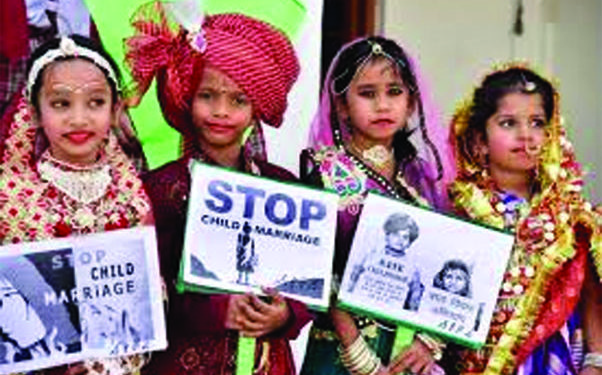NE NEWS SERVICE
NEW DELHI, MARCH 21
Over 500 child marriages were reported in the country in 2018, with the maximum being from Assam and TN stands in fourth place, Union Women and Child Development Minister Smriti Irani informed the Lok Sabha on Friday.
In a written reply to a question on whether the incidents of child marriages have increased over the years, the minister said the percentage of women (in the age group of 20-24 years), who were married before the age of 18, has reduced from 47.4 per cent in 2005-06 as per National Family Health Survey (NFHS)-3 to 26.8 per cent in 2015-16 as per the NFHS-4.
The government has enacted the Prohibition of Child Marriage Act, 2006 in order to prohibit child marriages rather than only restraining them, she told the Lok Sabha. The states and Union Territories are being pursued from time to time for effective implementation of the Prohibition of Child Marriage Act, 2006.
“Ministry of Women and Child Development regularly sending communicating with the states and Union Territories to increase alertness to prevent child marriages during festivals such as Akshaya Tritiya/Akha Teej etc,” she said.
She shared the data of the National Crime Records Bureau from 2016 to 2018. According to it, in 2016, 326 child marriages were reported while 395 and 501 child marriages were reported in 2017 and 2018 respectively.
Assam reported 88 child marriages, followed by Karnataka which saw 73 such marriages and West Bengal witnessed 70 such marriages in 2018. Tamil Nadu reported 67 such marriages in the same year.
Arunachal Pradesh, Goa, Jammu and Kashmir, Manipur, Meghalaya, MIzoraam, Nagaland, Sikkim, Daman and Diu, Dadra and Nagar Haveli, Lakshadweep did not see any child marriage from 2016 to 2018. Puducherry, which reported five child marriages in 2016 did not report any such marriages in 2017 and 2018. Delhi reported one case every year from 2016 to 2018.
The practice of child Marriages is largely due to the prevailing social customs, tradition, illiteracy, poverty, low status of women in society and lack of awareness, Irani said.
“These issues cannot be tackled by legislative interventions alone. The Beti Bachao Beti Padhao (BBBP) scheme envisages education of girls and reduce dropouts, thus delaying their marriage,” she said.
A significant part of the BBBP advocacy campaign is focused on creating awareness and discouraging the practice of child marriage.
This is a continuous process and the government undertakes media campaigns and outreach programmes to address the issue of child marriage, she added.










